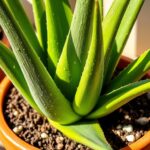I love my cat, Whiskers, and want to keep her safe. I learned aloe vera is bad for cats. It made me worry about Whiskers eating it.
Aloe vera can make cats very sick. It can cause vomiting and diarrhea. This can lead to dehydration and other serious problems. I wanted to learn more about this.

We will look into how aloe vera is bad for cats. We’ll talk about the parts of the plant and what makes it harmful. This will help you keep your cat safe.
Key Takeaways
- Aloe vera can cause severe vomiting and diarrhea in cats if ingested.
- The plant’s aloin and anthraquinones are the primary toxic compounds that can make cats sick.
- Cats may be attracted to aloe vera due to its moisture content and succulent nature.
- Immediate veterinary attention is crucial if you suspect your cat has consumed aloe vera.
- Providing a safe, aloe-free indoor garden can help prevent accidental poisoning.
Understanding Aloe Vera and Its Components
As a cat owner, knowing about aloe vera plants is key. These plants are good for us but bad for cats. Knowing what’s in them helps keep cats safe.
The Anatomy of Aloe Vera Plant
The aloe vera plant has different parts. The green leaves have a clear gel used in skincare. But, the yellow sap, or aloe latex, is dangerous for cats.
Active Compounds in Aloe Vera
The aloe vera plant has harmful stuff for cats. Saponins and anthraquinones can make cats sick. They can cause vomiting, diarrhea, and even tremors.
Different Parts of the Plant and Their Effects
- The gel can upset a cat’s stomach, even a little bit.
- The latex is very bad for cats and can make them very sick.
- Seeing a vet is important if a cat eats aloe vera.
Knowing about the aloe vera plant helps keep cats safe. It’s important for cat owners to understand the risks.
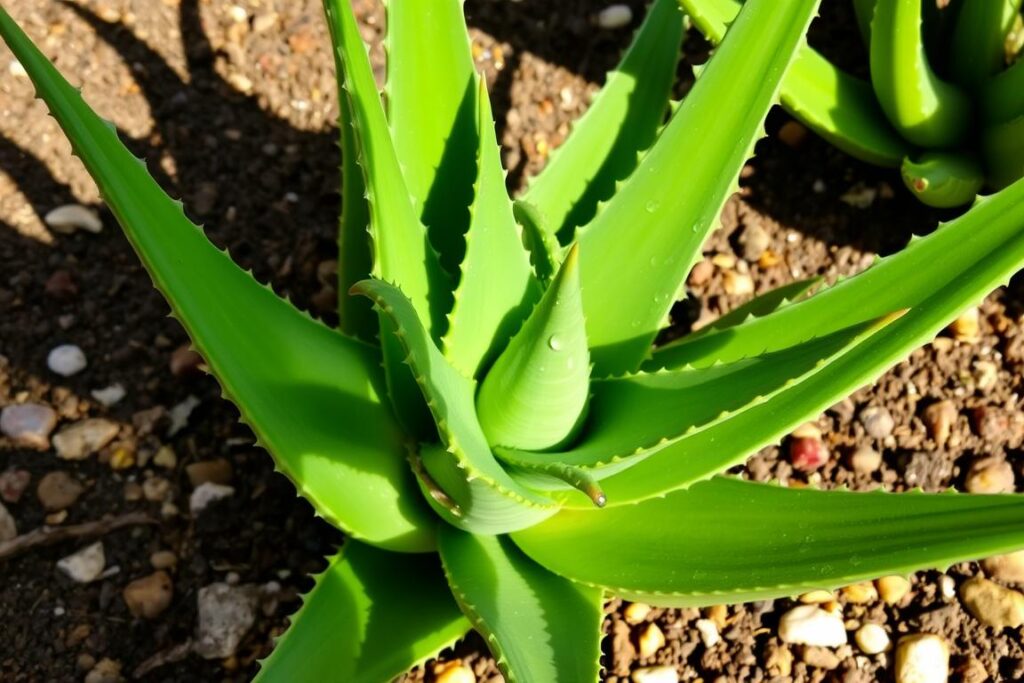
Is Aloe Vera Toxic to Cats: The Truth Revealed
It’s important to know if aloe vera is safe for cats. As cat owners, we need to know that aloe vera can be harmful to cats if they eat it.
Aloe vera has chemicals that can upset a cat’s stomach. If a cat ingests aloe vera, it might throw up, have diarrhea, and feel tired.
- Aloe vera’s white sap contains saponins and anthracene glycosides that can be toxic to cats.
- Ingestion of aloe vera may lead to vomiting, diarrhea, and lethargy in felines.
- While cats may not typically seek out aloe vera, accidental ingestion can occur.
The bad effects can vary. It depends on how much aloe vera the cat eats and how sensitive it is. Some cats might just feel a little sick. Others could get very sick or even poisoned.
“Exposure to aloe vera can lead to a range of unpleasant symptoms in cats, from mild stomach upset to more severe reactions. As pet owners, it’s essential to be vigilant and take steps to prevent our feline companions from accidentally ingesting this potentially harmful plant.”
To keep your cat safe, make sure aloe vera plants are out of reach. Watch for any signs that your cat has eaten aloe vera. Knowing how aloe vera affects cats helps us keep them safe and happy at home.
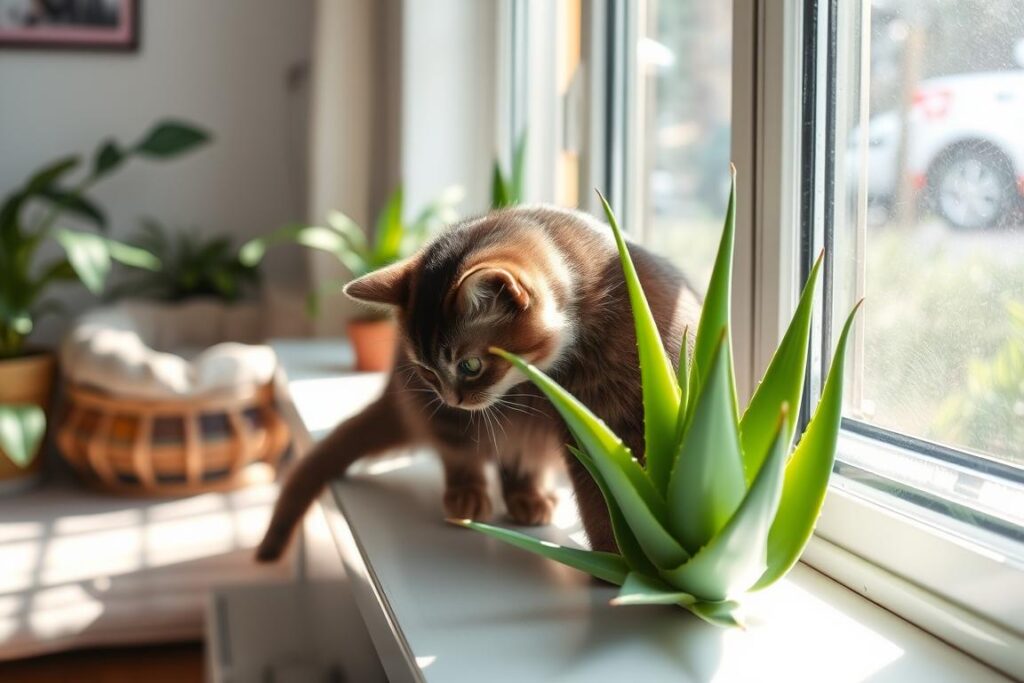
Common Signs of Aloe Vera Poisoning in Cats
If your cat eats an aloe vera plant, watch for signs of poisoning. Aloe vera has bad stuff called saponins and anthraquinones. These can hurt your cat’s health.
Immediate Symptoms to Watch For
Look for vomiting, diarrhea, tiredness, and not wanting to eat. In bad cases, your cat might shake, have seizures, or kidney problems. Watch your cat closely if they eat aloe vera. Symptoms can show up in 6-12 hours.
Long-term Effects of Aloe Exposure
Long-term aloe vera can damage organs in your cat. Get vet help fast if you see poisoning signs. Quick treatment helps your cat get better.
When to Seek Emergency Care
If your cat shows symptoms or eats aloe vera, call your vet. Fast help stops serious problems and keeps your cat safe.

Always put your cat’s safety first. Quick action keeps your cat safe from aloe vera poisoning.
Why Cats Are Attracted to Aloe Plants
Cats are curious and might like the look of aloe vera plants. Aloe vera is not the only plant that can be bad for cats. But, it’s very common in homes, so cat owners worry about it.
Aloe vera has special compounds that can upset a cat’s stomach if they eat it. Some plants, like Kalanchoe and Euphorbia, are even more dangerous. They can make cats vomit, have diarrhea, and get skin problems.
To keep cats away from aloe vera and other bad plants, make your home safe for them. Use cat-friendly plants and toys. Give them things to do, like scratching posts and puzzles. This way, they won’t be interested in your aloe vera and other plants.
Knowing how aloe vera can hurt cats helps you keep them safe. You can make a happy home where your cat can play safely. They won’t get into trouble with plants.
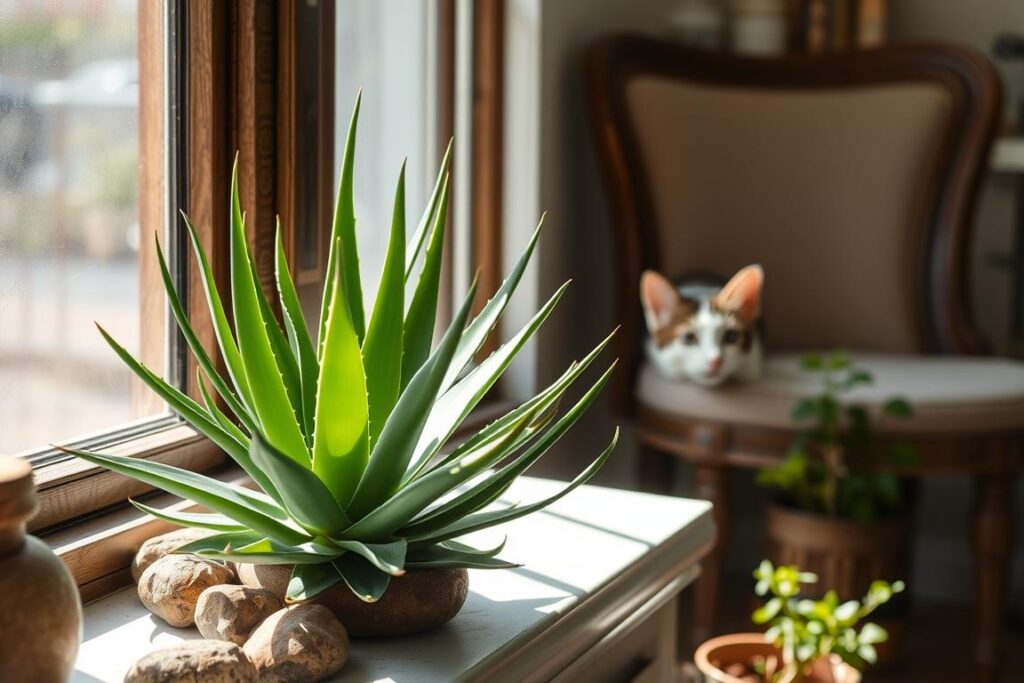
“Even non-toxic plants can cause gastrointestinal upset in pets with sensitive stomachs or due to chemical residues on the leaves.”
The Dangers of Aloe Latex for Felines
The aloe vera plant is good for us, but not for cats. The aloe latex is toxic to cats. It has anthraquinone glycosides that can harm them.
Understanding Aloe Latex Toxicity
These compounds can make cats very sick. They can cause vomiting, diarrhea, and more. Cats are more affected by these toxins than humans.
How Cats Process Aloe Components
The anthraquinone glycosides in aloe latex cause diarrhea. This can lead to dehydration and other problems in cats. If a cat eats aloe, get help right away.
Keep aloe plants away from cats. Use safe plants instead. Knowing about aloe latex dangers helps keep cats safe.
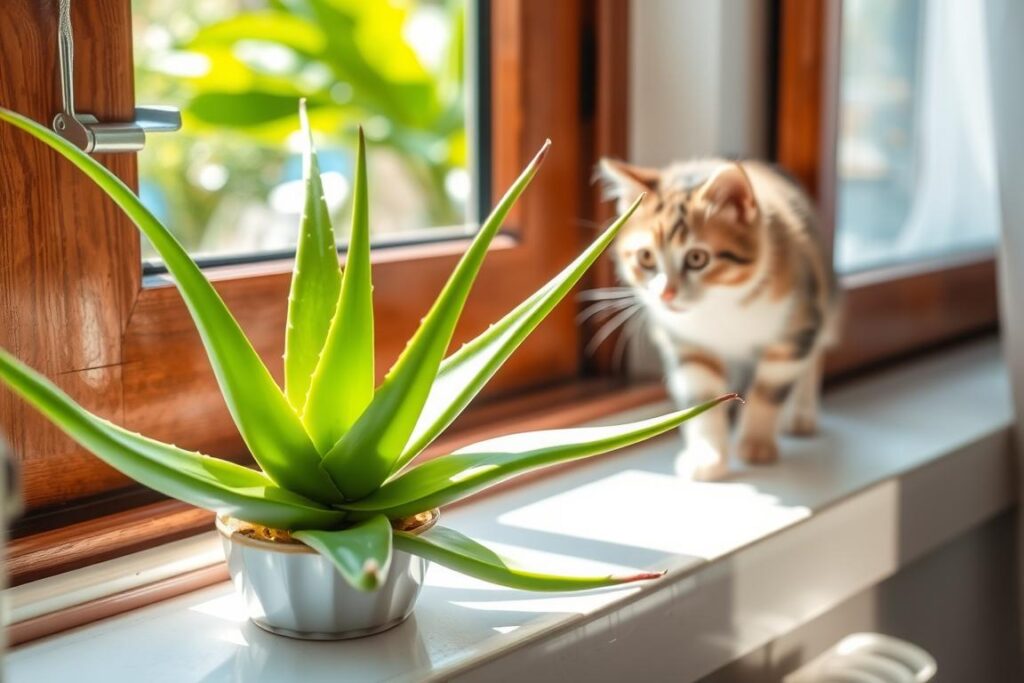
“Aloe vera contains essential nutrients beneficial for pets, including antioxidant vitamins C and E, beta carotene, vitamin B12, amino acids, and various minerals like magnesium, manganese, zinc, and potassium.”
Safe Alternatives to Aloe Vera for Cat Owners
As a cat parent, making your home safe is key. Aloe vera is not safe for cats. But, there are many cat-safe houseplants and cat-friendly succulents to choose from.
The spider plant is safe and cats like it. Boston ferns and some palms are also safe. Catnip and cat grass are great for cats to play and explore.
When picking plants, think about your cat’s safety first. Stay away from lilies, philodendrons, and azaleas. They are very bad for cats. A cat-friendly garden is good for your pet and looks nice too.
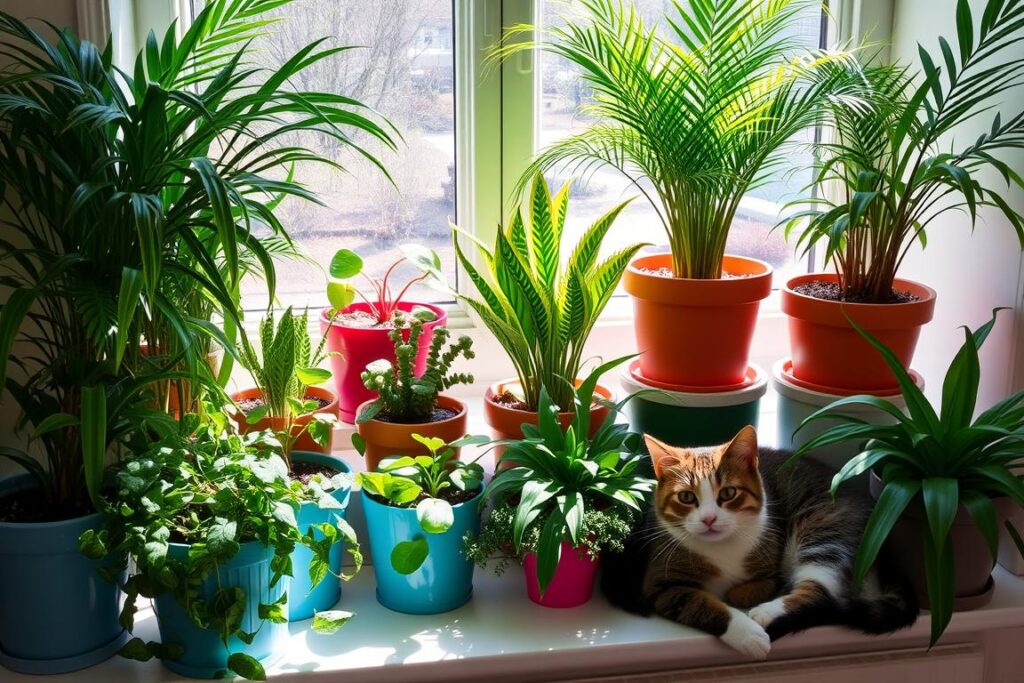
Your cat’s health is the most important thing. Choose cat-safe houseplants and avoid toxic houseplants for cats. This way, you and your pet can live happily together.
Emergency Response to Aloe Vera Ingestion
If you think your cat ate aloe vera, act fast. Aloe vera has a part called aloin that is bad for pets, like cats and dogs. Cats might throw up or have diarrhea after eating it. In some cases, they might even shake a lot.
First Aid Steps for Cat Parents
- Take out any plant parts from your cat’s mouth right away.
- Call your vet or a pet poison hotline fast.
- Don’t make your cat throw up unless a vet tells you to. It can make things worse.
- Get ready to take your cat to a vet clinic if needed.
What to Tell Your Veterinarian
When you talk to your vet, have this info ready:
- How much aloe vera your cat ate.
- When they ate it, if you know.
- Any signs they’re showing, like throwing up, diarrhea, or shaking.
Telling your vet these things helps them figure out what to do. Quick vet care is key. Aloe vera can really hurt your cat’s stomach and cause big problems if not treated right away.
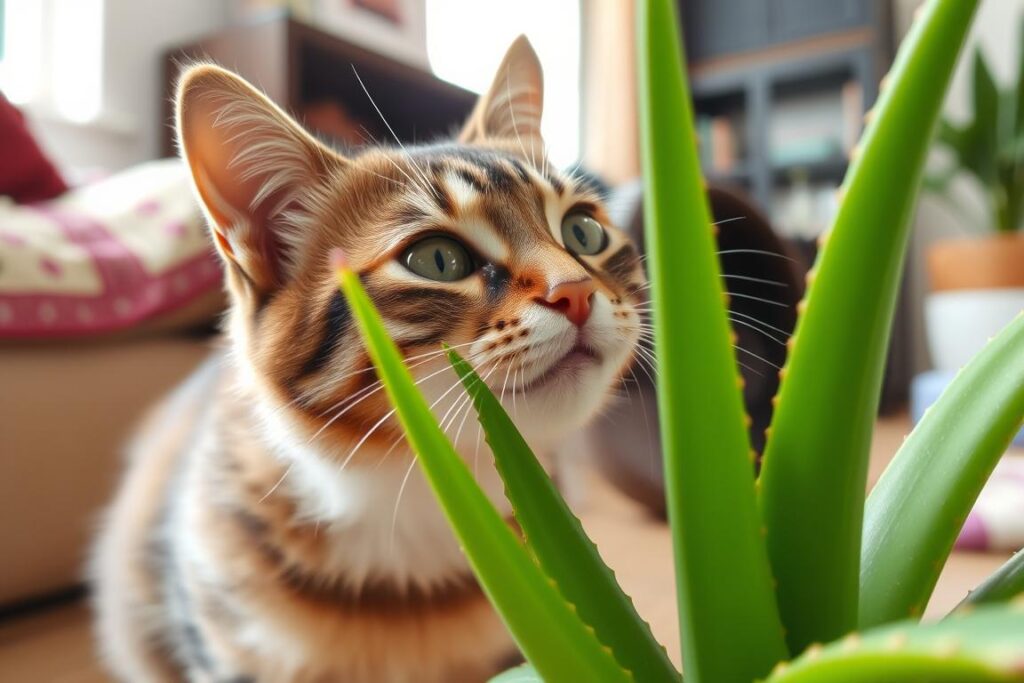
Always be careful to keep your cat safe. Quick action and listening to your vet can help your cat get better. This way, you make sure your cat stays safe and healthy.
Preventing Aloe Vera Poisoning in Cats
Keeping your cat safe from aloe vera is very important. Aloe vera plants can be harmful to cats if they eat them. To keep your cat safe, make sure they can’t get to these plants.
First, think about taking all aloe vera plants out of your home. If you can’t do that, put them where your cat can’t reach. You can also use sprays to keep cats away from plants.
- Give your cat safe plants to play with instead of aloe vera.
- Teach everyone in your home about the dangers of aloe vera to cats.
- Check your home and outside for aloe vera plants often.
By doing these things, you can lower the chance of your cat eating aloe vera. This keeps your cat safe and healthy.
| Common Household Plants Toxic to Cats | Symptoms of Ingestion |
|---|---|
| Lilies | Vomiting, lethargy, loss of appetite, kidney failure |
| Garlic and Onions | Anemia, lethargy, weakness |
| Chocolate | Seizures, tremors, heart arrhythmia |
| Unbaked Bread Dough | Alcohol poisoning, stomach expansion |
| Grapes and Raisins | Vomiting, weakness, abdominal pain, kidney failure |
Watch your cat’s space closely and remove dangers. A cat-safe garden is key for pet owners who love plants and their pets.

Treatment Options for Aloe Vera Poisoning
If your cat ate aloe vera, get them to the vet fast. Most cats get better with the right treatment. Let’s look at how to help your cat feel better.
Medical Interventions
The main goal is to fix the symptoms and stop more problems. The vet might do:
- Give fluids through an IV to help with dehydration
- Give medicine to stop vomiting and diarrhea
- Watch your cat’s health and keep them calm
- In very bad cases, your cat might need to stay in the hospital
Recovery Process and Timeline
How long it takes for a cat to get better depends on how bad the poisoning is. Cats with mild poisoning might get better in 24-48 hours. But, cats with severe poisoning might take longer, up to a week or more.
Always follow what the vet tells you to do. Give your cat their medicine as directed. With the right care, your cat will be happy and playful again soon.

Creating a Cat-Safe Indoor Garden
Creating a lush indoor garden is rewarding, but keeping our cats safe is key. I choose plants that are safe for my cat. Plants like Spider Plant, Boston Fern, and Calathea are good choices. They are safe and help clean the air.
I put plants on high shelves or in hanging baskets. This keeps them away from my cat. I also have Cat Grass for my cat to nibble on. This keeps them busy and safe.
Regular checks and natural deterrents like citrus peels keep our space safe. This way, we all enjoy a beautiful, safe indoor garden together.






